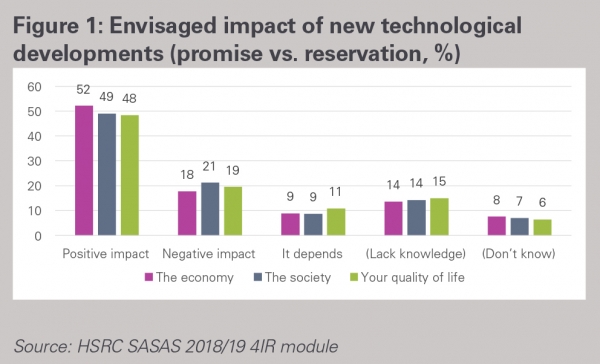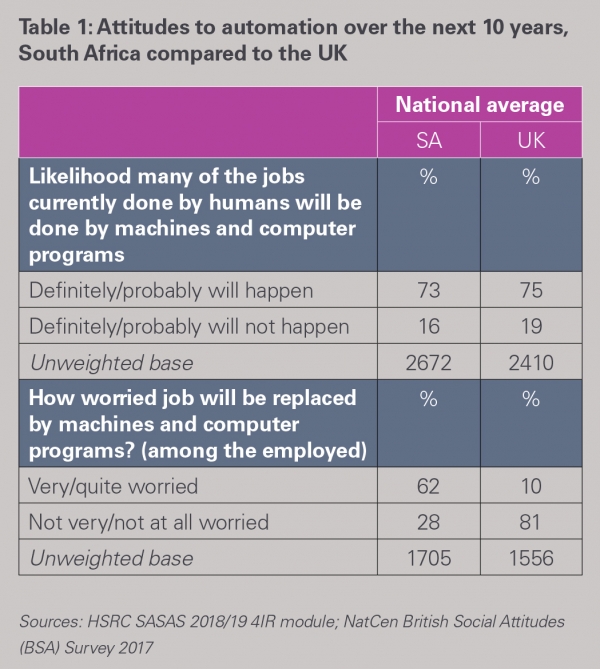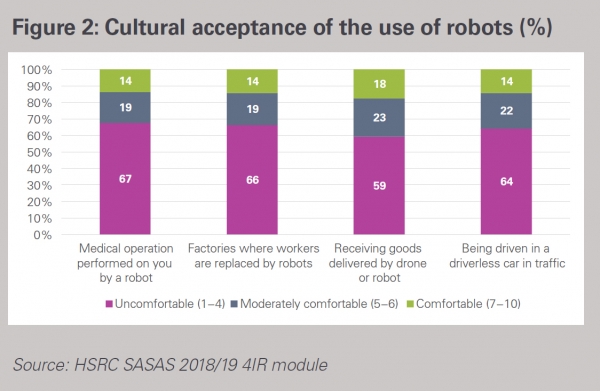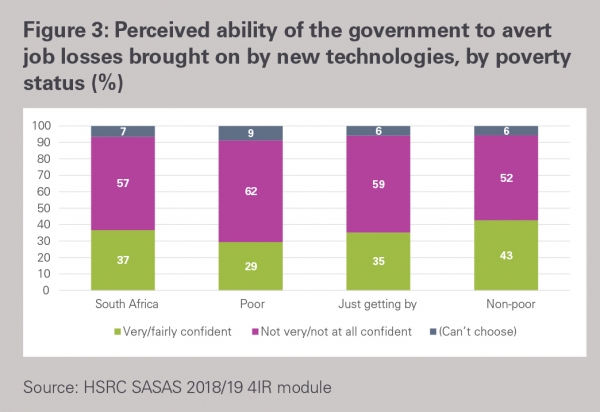Rise of the Robots: South Africans generally positive about technological advancements, but deeply concerned about job losses
During 2019, the impact that rapid technological innovations will have on societies and individuals in South Africa became an issue of substantive reflection and debate. This led to the idea of the 'Fourth Industrial Revolution' featuring frequently in political speeches, the popular media and in general conversation. In this article, Dr Ben Roberts, Prof Narnia Bohler-Muller, Jarè Struwig, and Dr Steven Gordon examine national survey data on attitudes towards technological change in the country to provide a more representative picture of the patterns of hope and concern among the public relating to the coming automation revolution.
Rapid technological change has been a growing point of discussion among policymakers, business and unions in South Africa. Powerful new technologies are emerging that will continue to affect individuals, communities and society in multiple ways. The term ‘Fourth Industrial Revolution (4IR)’, refers to a new era marked by the application of digitisation, automation and machine learning in different areas of society and everyday life. This ‘revolution’ is one that presents a distinct opportunity, but also substantive risk and human cost.
Despite the considerable attention devoted to this subject, the voices of average South Africans have been missing from the debate. Nationally representative data collected by the HSRC through the 2018/19 South African Social Attitudes Survey (SASAS) can contribute towards addressing this gap. Consisting of 2736 respondents older than 15 years, the results suggest the public recognises the promise and pitfalls of this technological turn.
A moderately positive view of digital technologies, but scepticism about the labour-market impact
When asked about the envisaged impact of recent computer and internet technologies on the economy, society, and personal quality of life, South Africans appear cautiously optimistic (Figure 1). Around half of South Africans (48−52%) believe that such technological advances are beneficial economically, societally and personally, whereas approximately a fifth express reservations (18−21%).
In the years to come, automation is expected to have an appreciable effect on the labour market, with robots and artificial intelligence able to perform certain types of roles currently performed by people. South Africans generally acknowledge that automation will have a bearing on the workplace, and a sizeable majority of the employed are concerned that it will affect them (Table 1).
Over three-quarters (73%) of South Africans believe that, in the next decade, machines or computer programs will assume many of the jobs presently done by humans. In addition, 6 in 10 workers (62%) are very or quite worried that such automation will threaten their job security.
Compared to the UK, South Africans exhibit almost equivalent views on the likelihood of automation affecting the labour market (73% versus 75%), but local workers demonstrate vastly higher levels of worry about the personal job impact of automation than is evident among British workers (62% versus 10%). This may be attributed to the way in which discourses around new technologies differ in each country.
Low levels of cultural acceptance of technological change
To gauge how culturally accepting South Africans are of technological change, respondents were asked to rate how comfortable they felt with four situations involving the use of robots: (i) a medical operation performed by a robot; (ii) factories where workers are replaced by robots; (iii) receiving goods delivered by drone or robot; and (iv) being driven in a driverless car or taxi in traffic. They provided scores using a scale from 1 to 10, where 1 means ‘totally uncomfortable’ and 10 means ‘totally comfortable’ (Figure 2).
On average, the South African public is not especially accepting of any of these four scenarios. Only 14−18% expressed comfort, 19−23% would be moderately comfortable, while 59−67% were uncomfortable with such propositions.
Ability of government to manage the labour-market effect of new technologies
Given the substantial concern over the potential job threat posed by new technologies in the future, how confident is the public that the government can intervene successfully to minimise adverse labour-market impacts? As Figure 3 shows, a little more than a third (37%) were very or fairly confident that government could effectively put in place strategies to ensure that new technologies do not result in job losses, whereas 57% were doubtful. Poorer South Africans express greater scepticism than better-off South Africans in this regard. While the survey results do not address the role to be played by other parties (especially market actors), they do nonetheless provide a sense of the views on state policy to address any adverse labour impact that automation might produce.
The new dawn
The analysis suggests that South Africans are generally more optimistic than circumspect about the impact of the newest digital technologies on society and their personal wellbeing. However, it is recognised that automation will affect the labour market and deep concerns exist over the threat this poses to jobs. There is also broad discomfort with robots performing a range of tasks. This points to quite low levels of cultural acceptance of the application of robots.
If technological change creates further labour-market inequality and sustained reductions in human employment, then carefully planned social, educational and labour market policies will be required to address low pay, precarious employment, and expanded, long-term unemployment.
At this stage, the public is fairly pessimistic about the ability of government to minimise the human costs of the 4IR. Ongoing multi-sectoral and public dialogue, such as that organised by President Cyril Ramaphosa, will be required to promote new insights and develop responses to rapid technological advancement. This should be accompanied by campaigns to inform the public about technological change and the planned response for the country.
Note: This article originally featured in The Conversation.
Authors: Dr Ben Roberts and Jarè Struwig, coordinators of the South African Social Attitudes Survey, Prof Narnia Bohler-Muller, executive director, and Dr Steven Gordon, senior research specialist, in the HSRC’s Democracy, Governance and Service Delivery research programme




